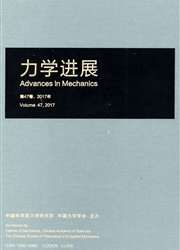

 中文摘要:
中文摘要:
可压缩湍流机理的实验研究是一件难度很大的工作,其主要的难度在于高时空分辨率的可压缩湍流结构非接触精细测试技术和低噪声的高速风洞设备技术.近几年来,由于在低噪声的超声速、高超声速风洞研究和可压缩流动精细结构测量技术研究方面取得的重要进展及其在可压缩湍流机理研究方面的应用,超声速流动转捩与湍流的机理研究取得了较大的进展.本文介绍了最近几年高速流动非接触精细测试技术,尤其是基于纳米粒子的平面激光散射技术(nano—tracer planar laser scattering,NPLS)、背景导向纹影技术(background oriented schlieren,BOS)和超声速流场的粒子图像测速技术(particle image velocimetry,PIV)的研究进展和发展前景,以及基于这些技术,在可压缩湍流机理实验研究方面的进展和发展前景,其中包括在超声速混合层转捩、超声速绕流与尾流结构、超声速边界层转捩、激波边界层干扰等典型流场的机理研究方面,以及气动光学机理研究方面的研究进展.最后,展望了目前湍流机理实验研究对湍流工程模型研究的可能贡献.
 英文摘要:
英文摘要:
The experimental research on the mechanics of compressible turbulence has long been a serious challenge. Major difficulties exist in the development of non-intrusive techniques for measuring fine structures with high spatiotemporal resolution and the technique of low-noise high-speed wind tunnel design. With the aid of the newly developed nano-tracer planar laser scattering (NPLS) technique and the successful design of the low-noise-level supersonic/hypersonic wind tunnel, the experimental researches on compressible turbulence advanced rapidly. Recent progresses achieved by our research group in the study of non-intrusive techniques such as NPLS, background oriented schlieren (BOS) and particle image velocimetry (PIV), and their applications in measuring fine structures in high-speed flows are reported in this paper., including the transition of supersonic mixing layer and boundary layer, the supersonic flow field around a body and their wake flow, the interaction between shock wave and turbulent boundary layer. The studies of the aero-optics in above flow fields are also introduced. The future prospects of the experimental research on the mechanics of compressible turbulence are also discussed here. At the end of paper, the research on turbulence mechanism, which is now under way, and its potential contributions to engineering modeling of turbulence are also elucidated.
 同期刊论文项目
同期刊论文项目
 同项目期刊论文
同项目期刊论文
 Experimental investigation on aero-optical aberration of the supersonic flow passing through an opti
Experimental investigation on aero-optical aberration of the supersonic flow passing through an opti Instantaneous and time-averaged flow structures around a blunt double-cone with or without supersoni
Instantaneous and time-averaged flow structures around a blunt double-cone with or without supersoni Statistical characteristics of the tilts of the aero-optical aberration caused by the supersonic tur
Statistical characteristics of the tilts of the aero-optical aberration caused by the supersonic tur Spatial density fluctuation of supersonic flow over a backward-facing step measured by nano-tracer p
Spatial density fluctuation of supersonic flow over a backward-facing step measured by nano-tracer p Universal form of the power spectrum of the aero-optical aberration caused by the supersonic turbule
Universal form of the power spectrum of the aero-optical aberration caused by the supersonic turbule Fine structures and the unsteadiness characteristics of supersonic flow over backward facing step vi
Fine structures and the unsteadiness characteristics of supersonic flow over backward facing step vi Modeling the temporal evolution of an aero-optical aberration with the minimum description length pr
Modeling the temporal evolution of an aero-optical aberration with the minimum description length pr Experimental investigation of interactions between laminar or turbulent boundary layer and shock wav
Experimental investigation of interactions between laminar or turbulent boundary layer and shock wav Experimental studies on flow visualization and velocity field of compression ramp with different inc
Experimental studies on flow visualization and velocity field of compression ramp with different inc An experimental study on fine structures of supersonic laminar/turbulent flow over a backward-facing
An experimental study on fine structures of supersonic laminar/turbulent flow over a backward-facing 期刊信息
期刊信息
